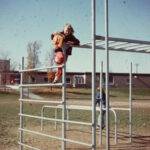Sunday is Mother’s Day, the twenty-four-hour period of required respect for the women who shaped us, and which, for today’s women, is life’s greatest cause of ambivalence. In my day, motherhood was the default occupation, the expected role of adulthood. Today women are urged to remain “free” to develop themselves, their careers, their interests and delay or reject motherhood—a decision as much expected by the culture as motherhood was of my generation. My argument is not with the development of women but the consequent devaluing of raising children.
I count myself lucky to have lived in an age before motherhood was a guilt trip in competition with the respect garnered by a career. My father never treated my mother with anything but respect and trusted her with full authority over both their children and the purse strings. I never heard “wait ‘til your father comes home,” or the dolling out of an “allowance.” My husband once remarked that my mother treated motherhood as a profession. She did. She believed women should be selfless, and her attitude toward homemaking and raising children shaped ours, for that’s what mothers do—shape us.
never heard “wait ‘til your father comes home,” or the dolling out of an “allowance.” My husband once remarked that my mother treated motherhood as a profession. She did. She believed women should be selfless, and her attitude toward homemaking and raising children shaped ours, for that’s what mothers do—shape us.
 During my years of motherhood, I was free to budget the family funds, decide the myriad decisions of everyday life—“yes, you can go to the woods if …,” “no, you can’t,” “when you’ve finished your homework …” and to arrange and rearrange household duties to suit the moment. I felt far freer than my husband, who, though professional, lived according to the time-clock and the pressures of academic life. I certainly never felt guilty taking time to shape the lives of our daughters.
During my years of motherhood, I was free to budget the family funds, decide the myriad decisions of everyday life—“yes, you can go to the woods if …,” “no, you can’t,” “when you’ve finished your homework …” and to arrange and rearrange household duties to suit the moment. I felt far freer than my husband, who, though professional, lived according to the time-clock and the pressures of academic life. I certainly never felt guilty taking time to shape the lives of our daughters.
I also lived through the age of change, when “stay-at- home mothers” fell into disrespect. As a young graduate student’s wife employed as an interviewer on a research project, I was paid less than my male colleagues. This, they told me, was because I was likely only employed until I became pregnant. When I appealed to the California Department of Health, asking, basically, why that mattered, they looked at each other embarrassed, and couldn’t think of a thing. I won.
This was before feminism painted its picture of “barefoot in the kitchen” women under the tyrannical oppression of their husbands. In my bare feet, I’d worked for the League of Women Voters, run political campaigns, returned to school for my Master’s degree, and won a prize for my first novel. My husband, like my father, respected the role I filled. The preening arrogance of the barefoot slave phrase enrages me. I was divorced when our children were teenagers, and that world disappeared. Like all working mothers, I struggled to find teaching jobs at local community colleges, and to manage teenagers. Believe me, that is not freedom.
oppression of their husbands. In my bare feet, I’d worked for the League of Women Voters, run political campaigns, returned to school for my Master’s degree, and won a prize for my first novel. My husband, like my father, respected the role I filled. The preening arrogance of the barefoot slave phrase enrages me. I was divorced when our children were teenagers, and that world disappeared. Like all working mothers, I struggled to find teaching jobs at local community colleges, and to manage teenagers. Believe me, that is not freedom.
Delaying motherhood sounds like a solution, but I’m not convinced it is one. First of all, it delays childbirth beyond its most fertile period, and therefore too often ends in futility or birth defects. Both needless tragedies. Secondly, it assumes that after one’s career is established, time constraints will lessen. My own experience says this simply isn’t so. Thirdly, it continues the assumption that motherhood is a sideline to be dropped when the pressures of career become too much.
This last, the attitude toward motherhood itself, is, for me, the crux of the problem. It rests on the belief that anyone can do it—that the basic  duties of motherhood can be handed off to caregivers with random qualifications. It also assumes that the children will not suffer, though it is far too soon to make such a claim. The return of women to the workplace has radically changed the world children grow up in. I recently
duties of motherhood can be handed off to caregivers with random qualifications. It also assumes that the children will not suffer, though it is far too soon to make such a claim. The return of women to the workplace has radically changed the world children grow up in. I recently heard a social scientist complain of the loss of community in today’s suburbs. “There is a hollowness,” he said. “an emptiness.” No children played ball in the playground, no one walked the streets. “Yes,” I wanted to answer. “That’s what the women did—the mothers.” They were the creators of the networks that included schools and churches and within that network they nurtured the next generation.
heard a social scientist complain of the loss of community in today’s suburbs. “There is a hollowness,” he said. “an emptiness.” No children played ball in the playground, no one walked the streets. “Yes,” I wanted to answer. “That’s what the women did—the mothers.” They were the creators of the networks that included schools and churches and within that network they nurtured the next generation.
Maybe, after all, it’s the relinquishing of that value system, in the name of “liberation” and “freedom” that we mourn today. Respect is what we sought in a culture shaped by the ego-centric, competitive, power-centered individualism of the male role. It is bringing respect, but thousands of women are feeling the loss as they try to piece together the task of motherhood out of the left over pieces of their lives. It’s time to demand respect for the role of raising the next generation, and a bouquet of flowers once a year isn’t going to do it.



Wow! I am in awe of your writing. This should be an Op-Ed piece in the New York Times for everyone to read.